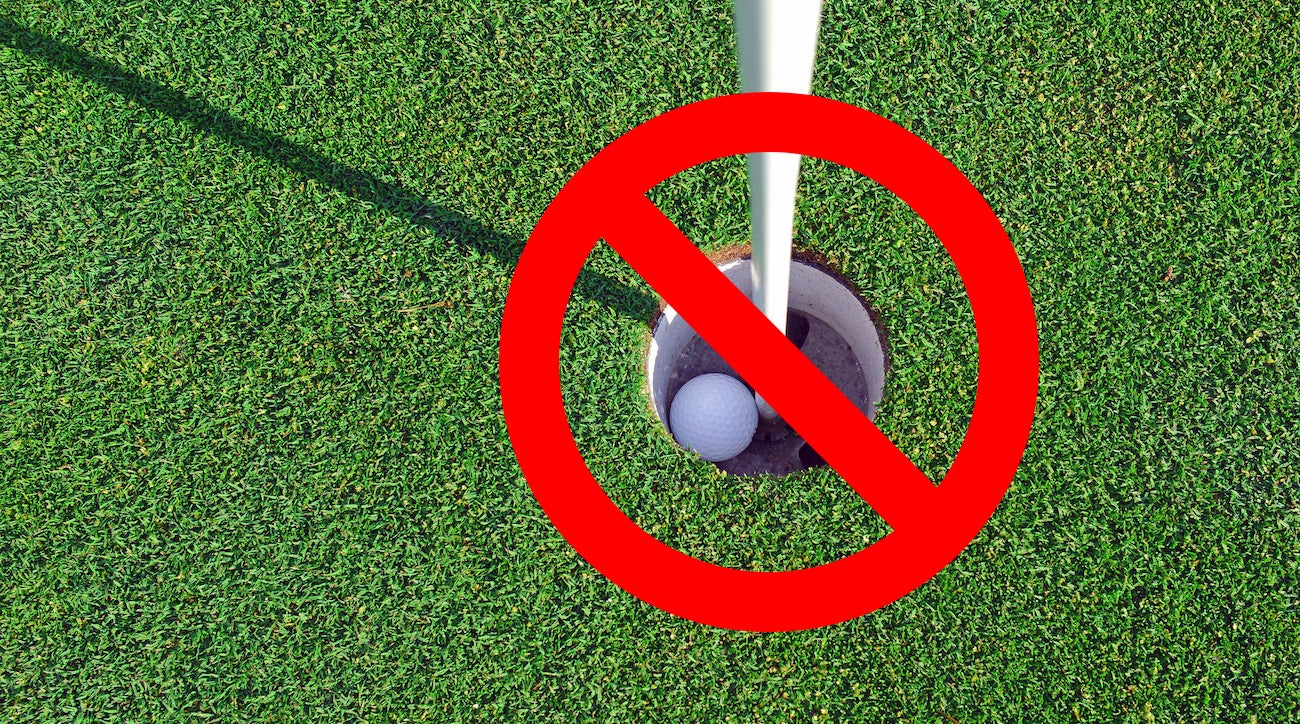
Any great shot is a cause for celebration, up to a point.
Getty Images
John from Savannah writes:
I’ve got a nutty “hole-in-one” story for you. A friend was recently playing in a two-vs-two match against a couple of guys he didn’t know very well. On the par-3 8th hole, which plays over water, one member of the opposing team tops his tee shot into the drink. Feeling generous, my friend and his partner grant the guy a mulligan, and — get this — the dude ends up holing the shot. It’s a second-ball ace, but the guy starts celebrating like it’s a legitimate hole-in-one. High fives. Chest bumps. The whole deal. My friend is gobsmacked, but he doesn’t want to spoil the fun by being the, “uh, nice par” guy.
Meantime, the second-ball ace guy keeps getting more exuberant. He calls the shop and tells the pros he made an ace, without mentioning that it was on a mulligan. Not only does he make a huge deal of it, the pro shop also does, too. Turns out this has all happened on a newly installed tee, so the club hails the shot as a kind of record “first ace from the new tee!” They have the guy sign a clean scorecard with a ‘1’ on the 8th for posterity. On top of that, hole-in-one insurance kicks in, so everyone at the club (and it was busy day) gets a free drink.
Now, in hindsight, my friend feels culpable in the whole thing but also feels like it’s far too late to say anything.
Anything he could or should do?
Dear John,
Where to begin unraveling the many layers of wrong in this farcical affair.
Of course, a second-ball ace no more counts as a real hole-in-one than the Etiquetteist’s recent tap-in on the 18th at his local muni qualified as a clutch putt to win the Masters. And while holing a shot from the tee is exciting in any context, not even a sudden rush of on-course euphoria justifies the amount of celebratory self-delusion and deceit that followed here.
As your friend surely knows, the time for him to speak up would have been in the moment, and he could have done so without being a confrontational killjoy. In golf, as in life, so much depends not just on what you say but how you say it. In this instance, your friend could have taken a stand as the amiable voice of reality, reminding everyone of what had actually transpired without coldly dismissing the other guy’s achievement. A simple, genuinely excited-sounding remark like, “Great shot! That’s gotta be the most incredible par I’ve ever seen” would have gotten the point across, the point being: That was really cool, but let’s not get carried away here.
By remaining silent at that moment, your friend became complicit in what was a largely harmless, if pathetic, little lie, which is unfortunate. But as ethical trespasses go, it was a relatively minor offense. Problem is, things didn’t end there. The absurd little lie expanded, entangling others in its web.
Surely, that’s what your friend feels badly about. The good news is, he’s wrong to think that it’s too late to do anything. While talking to the fake ace-maker would be a waste of time (nothing would likely come of it, other than some shouting), your friend has every right (indeed, the Etiquetteist would argue that he has the obligation) to contact the pro shop and let the club know that it has a bogus record on its books, one that it might like to expunge. (While he’s at it, your friend might also want to let the managers of the club’s hole-in-one insurance know that they has been defrauded of a bunch of cocktails.)
The bottom line is this: The charlatan who jarred that second-ball “ace” is clearly comfortable living with his lie. But others shouldn’t have to live with that lie, too.
Your friend still has a chance to make things right, which would be a genuine cause for celebration — for which the Etiquetteist would happily buy a round of drinks.










